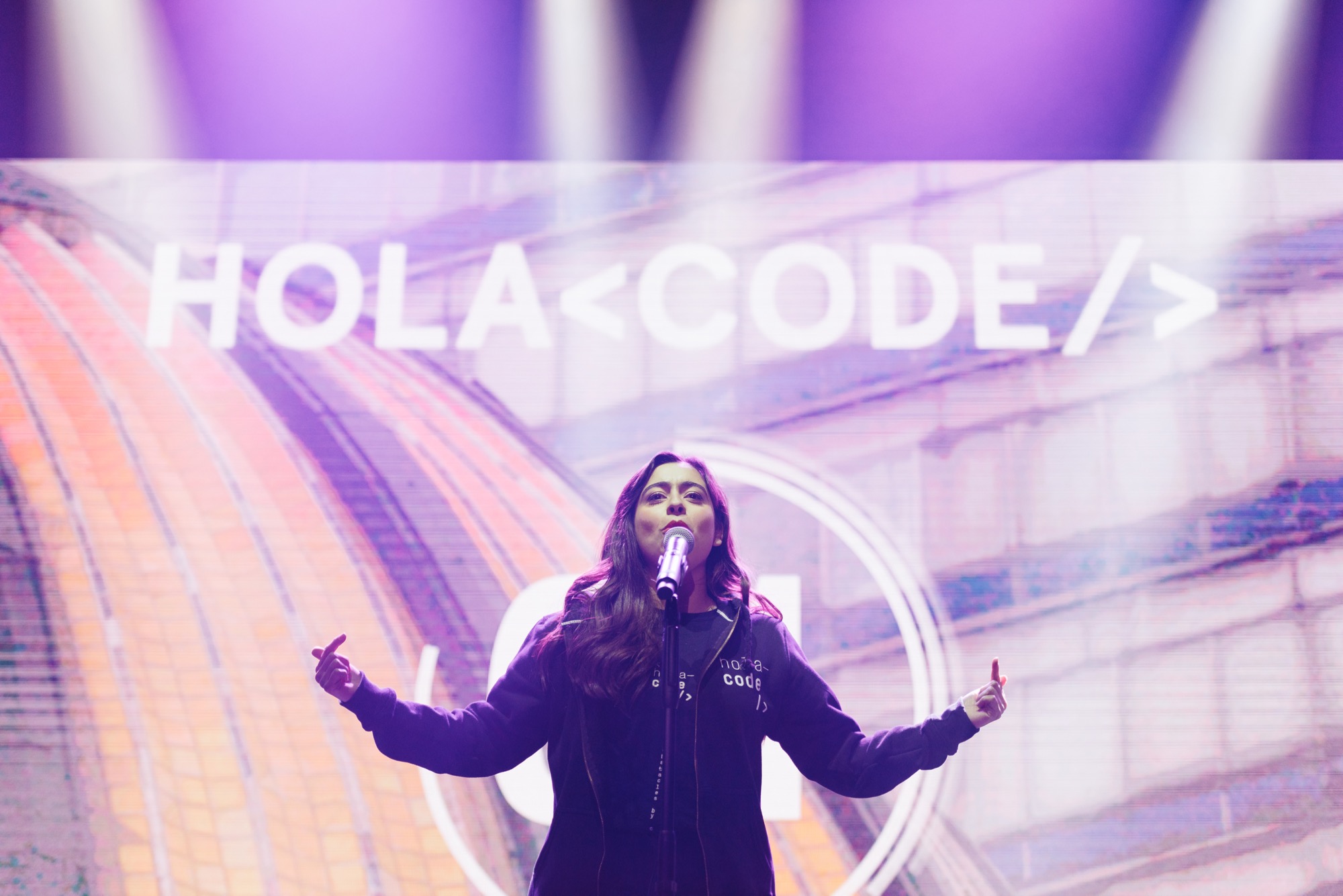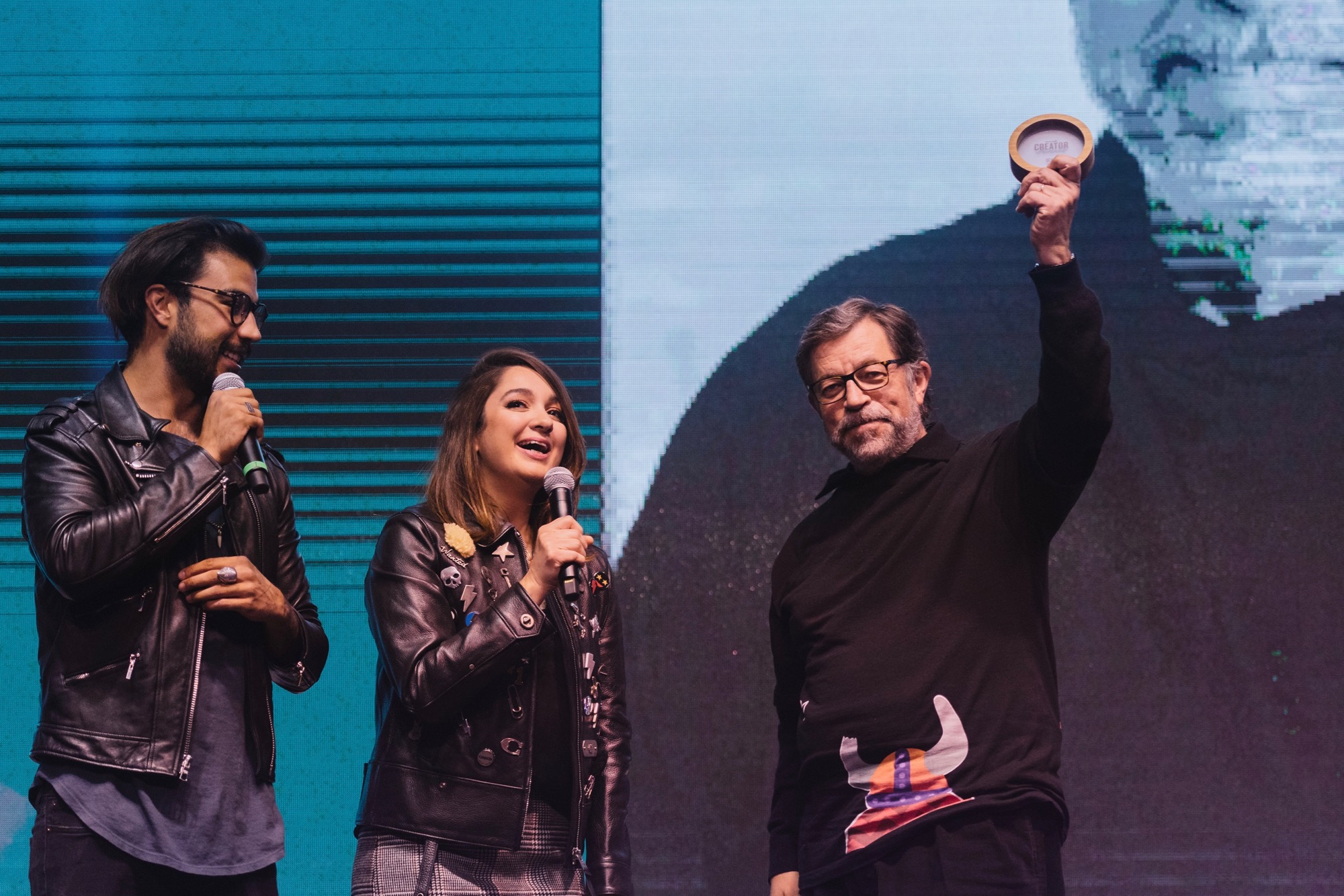The crowd might have seemed partisan to Antonio Purón. The Hola<code> cheerleaders were out in force, springing up from their chairs, banners in hand at every mention of their organization. The two owners of Ceviche Surf had their raucous fans, as did the all-female team of biotechnology engineers from Ecoplaso. Yet Purón stood undaunted.
He strode to the mic to state his mission in 45 seconds: “TAK-TAK-TAK is a project for children at the bottom of the pyramid to receive an education.” His project, TAK-TAK-TAK by Inoma, has developed 85 video games across mobile and PC platforms to teach children in underserved communities through play.
Asked how he was sure children would play his games, he replied, “We went to Chiapas [one of Mexico’s poorest states] to a remote school with very low connectivity [and] installed our games. We found out the kids asked the teacher to open the school on Sundays to play TAK-TAK-TAK.” The best kind of answer—simple, powerful, and deserving of the U.S. $180,000 Audience Choice award.
Amid headlines about crime or immigration involving Mexico, the Mexico City Creator Awards was the place to recognize a very different reality. Virtually every creator, nominated and awarded, spoke of a unique and joint commitment: using their ideas, their energy, their very blood to make Mexico a better place.
Every creator spoke of a unique and joint commitment: using their ideas, their energy, their very blood to make Mexico a better place.
This blend of national pride and creative commitment was peppered throughout the first Creator Awards held in Mexico City. The global competition, sponsored by WeWork, celebrates ideas with impact and heads to Shanghai next. Hosted at the Corona Forum, more than 2,700 people gathered to witness the best of the country’s entrepreneurial culture. Besides the Audience Choice award and a Community Giver award for those doing good within their WeWork community, prizes were given out in three main categories: the Incubate Award, for great ideas or specific projects that need funding; the Launch Award, for young businesses and organizations that need a little help getting off the ground; and the Scale Award, which is for more established operations aiming to get to the next level.
To kick things off, industry leaders hosted master classes before the awards ceremony. The first panel, featuring chef Eduardo García, discussed culinary entrepreneurship.
“I saw Mexico as a country where opportunities didn’t exist,” he said. “But I found a completely different country. I arrived [in 2007] with nothing in my pockets, so I tell my cooks that if they truly want to achieve something, they can do it.” Eleven years later, his culinary mastery has led him to own three renowned restaurants and create more than 100 jobs.
The crowd gave Garcia a standing ovation as he said that despite being seen as “illegal aliens” in the US, Mexicans have every opportunity to succeed.
That energy and participation was the lifeblood of the evening. Shouts of “I love you” accompanied singer Natalia Lafourcade as she sat down for an interview with Karla Martinez, editor-in-chief of Vogue México.
Even Miguel McKelvey, cofounder and chief culture officer of WeWork, was taken aback when he took to the stage. “This is one of the most amazing things I’ve ever seen,” he said. “I gotta take a picture from up here.” Despite his first name, McKelvey apologized for not speaking Spanish before revealing how impressed WeWork had been with the creativity shown in the over 1,300 applications received in the Creator Awards.
The need for such creativity was evident in the range of the candidates for the Incubate awards. Acordando Caminos transports people living in remotest Mexico when in need of medical emergencies. El Pequeño Gran Escritor gathers stories written by children and has them illustrated by professional artists before publishing them. In the end, all six Incubate finalists took home $18,000.
Then came time for the Launch category and a passionate pitch from César Esquivel Tellez. His organization, Blooders, puts those in need of blood donations in touch with potential donors across Mexico via an app. This might seem an obvious solution in the age of crowdsourcing, but, as Esquivel Tellez said, “One in four people will need blood at some point, yet Mexico is the worst country in Latin America for blood donations.”
Beyond having helped 13,000 people receive blood in 2017, Blooders also uses a novel idea: get them while they’re young. By visiting schools across the country, Blooders raises awareness among kids about the importance of blood donation and gets them to bring in their parents to donate. In his 45-second pitch, Esquivel Tellez said he hoped to reach 30,000 people in 2018. The $180,000 Launch prize will help him meet that goal.
Finally, the big winner of the evening was Someone Somewhere, which won $360,000 in the Scale category. The idea for Someone Somewhere arose when Antonio Nuño and his friends visited artisans around Mexico and saw the poor conditions they lived in. “There are 7 million artisans living in poverty in Mexico, often because their products simply are not useful on a daily basis,” he said.
Fifteen years later, Someone Somewhere has, on average, tripled the revenue of its suppliers, making T-shirts, hats, and backpacks designed for everyday wear. Nuño’s win in the Scale category was sealed when he encapsulated the next step for his company: the lucrative US market.
At a time of division and doubt, what could be more meaningful than improving the lives of Mexican craftsmen than by tapping the neighbor to the north of the Rio Grande? McKelvey asked for an XXL shirt on the spot.




Winners of the 2018 Mexico City Creator Awards
Scale – $360,000
Launch – $180,000
Audience Choice – $180,000
Tak-Tak-Tak by Inoma
Incubate – $18,000
Acortando caminos
Amigos sin Frontera a.c.
Ceviche Surf Co
ChemaTierra
El Pequeño Gran Escritor
KROKIS diseñando experiencia
Community Giver – $18,000
Documentalistas Sin Fronteras
Voluntarios México







